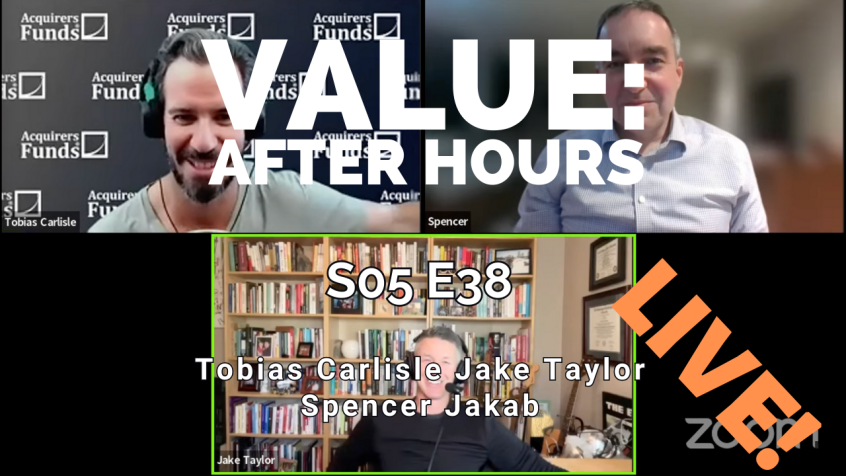During their latest episode of the VALUE: After Hours Podcast, Taylor, Carlisle, and Jakab discussed Navigating the ‘Q’ Designation and ‘Greater Fool’ Theory in Investing. Here’s an excerpt from the episode:
Tobias: It’s not far wrong. One of the other interesting things that happened through that period was anytime a company went into bankruptcy and it got the Q on the end of it, it was like a seal of approval.
Jake: [crosstalk] [laughs]
Tobias: Yeah. [laughs] When Hertz got the cue, it went absolutely bananas. Did you follow Hertz?
Spencer: Yeah. The crazy thing there is because it had happened before. So, imagine, you’re a young person and you heard about a friend or a friend of a friend or you read online, someone who doubled or quadrupled their money when the stock got the cue. Not all cues are created equal, right? There are some stocks in bankruptcy where there is some recovery, where you can make money if you have a very sophisticated understanding.
Jake: Is Q for quality? Is that what the–?
Spencer: No, I think that that–
Spencer: Oh, okay.
Spencer: I think that might not be it. But obviously, there are many companies where it is very clear that you’re not going to recover anything that this thing still trades, but you’re not going to make money. But it doesn’t matter. If you bought it at a buck and sold it at 2 bucks, you made 100%. The poor guy, the kind of the greater fool who bought it at 2 bucks maybe, he or she sold it at 3 bucks and made 50% and so on and so forth until someone got left holding the bag. It’s just like someone winning the lottery. Mathematically, I think the vast majority of people, it’s not right to call the lottery like a tax on numeracy, because I think most people understand that the expected return of a lottery ticket, a Powerball ticket is negative, but they still buy it because they read about someone who made a lot of money and they want a dream. They think that-
Tobias: It’s their hope.
Spencer: -it’s lucky this time. And so, I think that greater fool– That is the saddest thing about this whole episode and all the kind of echoes of it is that the young people who have gotten into investing, I view it as a good thing because young people were not interested enough investing and having brokerage accounts and having starting 401(k)s or IRAs or what have you before this. And now they got into investing, but too many of them view this—
First of all, they view it as a get rich quick and greater fool theory, which is obviously not the path to riches. You’re going to be a net loser as a group doing that, because you do need a greater fool, and the greater fool is when things are really elevated is definitely going to be coming from that cohort. It’s not going to be coming from some hedge fund. So, you need someone to lose in order for you to have that walk away with that gain.
But the other thing is that then there are all these MOASS and other conspiracy theories where they blame some shadowy cabal of being behind their losses rather than their own stupidity and greed, and then they just get disgusted with investing with Wall Street. And what’s the most expensive thing? If you lose $500 or $1,000 when you’re 23 years old, it’s not that big of a deal. You lost $1,000. So what? In terms of tuition, that’s pretty cheap, if you wake up.
I do know people and you probably do know people too, who made dumb financial and investing mistakes and said, “You know what? I’m going to just follow the straight and narrow and maybe buy a book, or watch and Acquires Multiple podcast, or whatever and understand–”
Jake: No, they’re trying to make money, sir.
[laughter]Spencer: Understand what the long-term formula is for success over decades. That’s a good thing. But unfortunately, that’s going to be a small minority of the people who got caught up in this thing. I think also a small minority get wrapped up, and it’s a really small vocal group of people who believe in MOASS and what have you and think it’s a conspiracy. I don’t think that’s that many people, either tens of thousands maybe, who are really obsessed with this. The remainder, I think, are just going to be disillusioned and say the stock market is rigged and it’s not for me and I’m going to, I don’t know, buy cryptocurrency or not save or not set up an account. That measured over decades is going to cost them a lot of money, the fact that they’re not multiplying their wealth.
You can add up your wealth. You can put your money in a bank account, and addition will only get you so far. It’s multiplication that gets you a big NASDAQ and compounding and they’re going to forego that, which is really a shame. And so, that I think is the saddest, most expensive outcome of this ethos that emerged the last few years among the newest investors.
You can find out more about the VALUE: After Hours Podcast here – VALUE: After Hours Podcast. You can also listen to the podcast on your favorite podcast platforms here:
For all the latest news and podcasts, join our free newsletter here.
Don’t forget to check out our FREE Large Cap 1000 – Stock Screener, here at The Acquirer’s Multiple:



